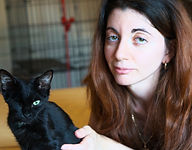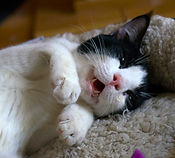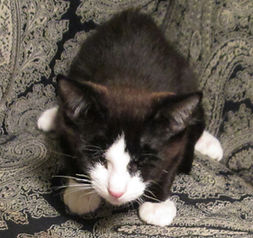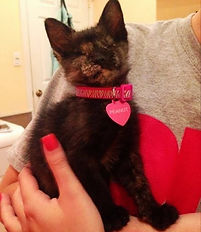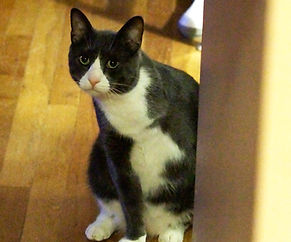
Great Pets Need Extra Love
Special Needs Pets
Special Needs Cats may have been born with a special need, or contracted it due to illness, accident, injury, infection, disease, malnutrition, or other means. All special needs cats can be loving, active cats, despite what humans might call a “disability.” Some only require a mimimal amount of extra care, and many can have long, happy lives.
Unfortunately, many special needs pets are passed up for adoption despite all the love they have to offer. These pets all deserve a forever home as much as any “normal” cat.
Cats frequently relate to humans as though we are parents and themselves as juveniles. A disabled cat is even more likely to view their owner as provider and may exaggerate its own role as kitten because it is so dependent. In that way, they can be even more affectionate than a cat without a disability.

Be Special... Adopt a Special Needs Cat
"Their bodies may be imperfect, but their spirit remains intact.
So it is said about the special needs cat. Although caring for one can be challenging, more and more people are opening their hearts and their homes and adopting them. For this reason, more and more cats that might otherwise be euthanized are being given a new lease on life."
Adopting Cats with FIV
Article By: Nomi Berger
"A cat diagnosed with the Feline Immunodeficiency Virus (FIV) is still and ADOPTABLE cat.
What, then, is FIV?
FIV is a type of virus called a retrovirus. It is in the same family as feline leukemia virus (FeLV) and human immunodeficiency virus (HIV), the virus that causes AIDS in people. It is a slow virus that attacks the immune system over a period of years, making the cat more susceptible to secondary infections and cancers.
There may be no cure for the virus itself, but it is NOT a death sentence. Most FIV positive cats can live long and happy lives, provided they are both protected from and treated promptly for any secondary infections they may contract. Some even live their entire lives without ever coming down with the actual illness."
MIKEY
FIV+
LEA
FIV+
Adopting Cats with Feline Leukemia
Article By: Nomi Berger
"A cat diagnosed with Feline Leukemia (FeLV) is still and ADOPTABLE cat.
What, then, is FeLV?
FeLV is a virus that weakens a cat’s immune system, predisposing it to certain infections, severe anemia, and potentially leading to cancer. Most at risk are kittens born to FeLV positive mothers, cats under the age of one, cats living with an infected cat, and cats bitten by an infected cat if they’re allowed outside."
The Truth about "Wobble Cats"
"Some cats suffer from Cerebellar Hypoplasia (CH), aka “Wobbly Cat Syndrome”.
This is a neurological disorder causing uncoordinated movement when they walk. A cat will learn to compensate for their condition. While there is no cure for CH, it is not a progressive illness, meaning that it will not get worse over time. Wobble Cats will still be able to eat, play and use a litterbox without problem. They have a normal lifespan."

BONK: has moderate CH, but he gets along just fine in his forever home.

KHALEESI, another CH kitty was rescued from AC&C at just four weeks old and adopted by Chris & Cathy Mancuso, two of SI Hope's volunteers.
Advice on Caring for a Blind Cat
Blind cats can do pretty much everything that a seeing cat can do. They can climb, play, eat and find their litter box on their own. They live a normal life span.
Always keep important cat items always in the same place, like the litter box and food bowls.
For the rest of the house, live normal; they will go around things. Cats will use their whiskers as sensors, the wiskers will brush against something before they bump into it.
You CAN move your furniture. They will quickly readjust to the change.
If you pick up a blind cat and move him/her, try to put them down where they have a good idea of where they are: in the litter box, at their food bowl or where floors have different texture.
OLIVE: Formerly Juno. This blind kitten is living the good life with her new mom Stella and her brother Rusty. She is a very happy, playful girl despite her lack of sight.
SONIC (AKA SONIC BOOM): Adopted in 2015. This litten needed both his eyes removed, but he is getting along well in his forever home with his loving family.
PEANUT: A recent rescue kitten who needed to have her eyes removed due to a terrible infection. Although she is now blind, she will have a full life. Peanut found a great home with a loving adopter and a new big brother in time for Easter!
Three-Legged Cats
Three-legged cats adapt well and are usually as agile and active as 4 legged cats.
They must work out his new limitations and how to compensate for a missing leg. If he has lost a hind leg, he may not be able to jump as high. If he has lost a foreleg, he may find landing more difficult.
He must build up additional strength in his other limbs to compensate. He can't do this if you carry him everywhere.
It is important that a three-legged cat is not allowed to become obese because he has fewer limbs on which to distribute his weight.
Deaf Cats
*This article is from the ASPCA website: http://www.aspca.org/pet-care/cat-care/deafness
What Is Deafness? Deafness in cats is a temporary or permanent loss of hearing that can be caused by infection, certain drugs, ear mites, congenital defects, old age or injuries.There are different types of deafness. One-sided or partial hearing loss can occur, or both ears may be affected. Deafness can originate in the ear structures, or caused by difficulties in the brain’s processing of neurosensory information.
What Causes Deafness in Cats? Temporary hearing loss can be the result of mild infections or a side effect of certain drugs like amino-glycoside antibiotics and

diuretics. Another common cause of temporary hearing loss in cats is ear mites, which damage the ear drum, resulting in inflammation of the middle ear. Tumors or polyps in the ear can also affect hearing.Permanent hearing loss can be caused by old age, continued exposure to loud noises, injury or severe, untreated ear infections, especially those of the middle ear. All-white, blue-eyed cats are often born deaf.
When Should I Be Concerned About My Cat’s Hearing? The following signs may indicate that your cat is suffering from hearing loss:He shows no response to outside stimuli, such as loud noises.He seems disoriented.He doesn’t know you’re in the room until you physically touch him.It is difficult to wake him up.He walks with an unbalanced gait.If you suspect hearing loss, take a look at your cat’s ears. Reddened ear canals or black or yellow discharge could indicate a problem.Note: You can test your cat’s hearing by stepping quietly behind him and clapping once loudly to check his response. Make certain your cat cannot see or sense your movement when you clap your hands. You may have to repeat this test more than once to get an accurate assessment.
How Can I Keep My Deaf Cat Safe? Never let a hearing-impaired cat outside. He will not be able to hear traffic or other perils, and will also lack the necessary reaction time to protect himself.Attach a bell to your cat’s collar so you can locate him if he does get out.Alert your cat to your comings and goings by touching him gently when you enter or leave a room.Do not startle a deaf animal.Try getting your cat’s attention with a loud stomp; the vibration on the floor should reach him. You can also throw a small ball or toy into the line of his sight.Deaf cats can learn sign language or be trained with lights or other devices.
How Can Deafness Be Prevented? Regularly inspect your cat’s ear canals—they should appear pink and clean—and visit your vet immediately if you suspect a possible ear infection or hearing loss. Unless your veterinarian has shown you how to do so safely, do not use over-the-counter medications or insert cotton-tipped applicators into your pet’s ear canal—this could damage delicate structures.
How Is Deafness in Cats Treated? If your cat has ear mites or an infection, your vet will prescribe an appropriate treatment method to eliminate the problem. Permanent hearing loss cannot be reversed, but cats are extremely adaptable and will use their other senses to compensate and continue to enjoy a good quality of life.



